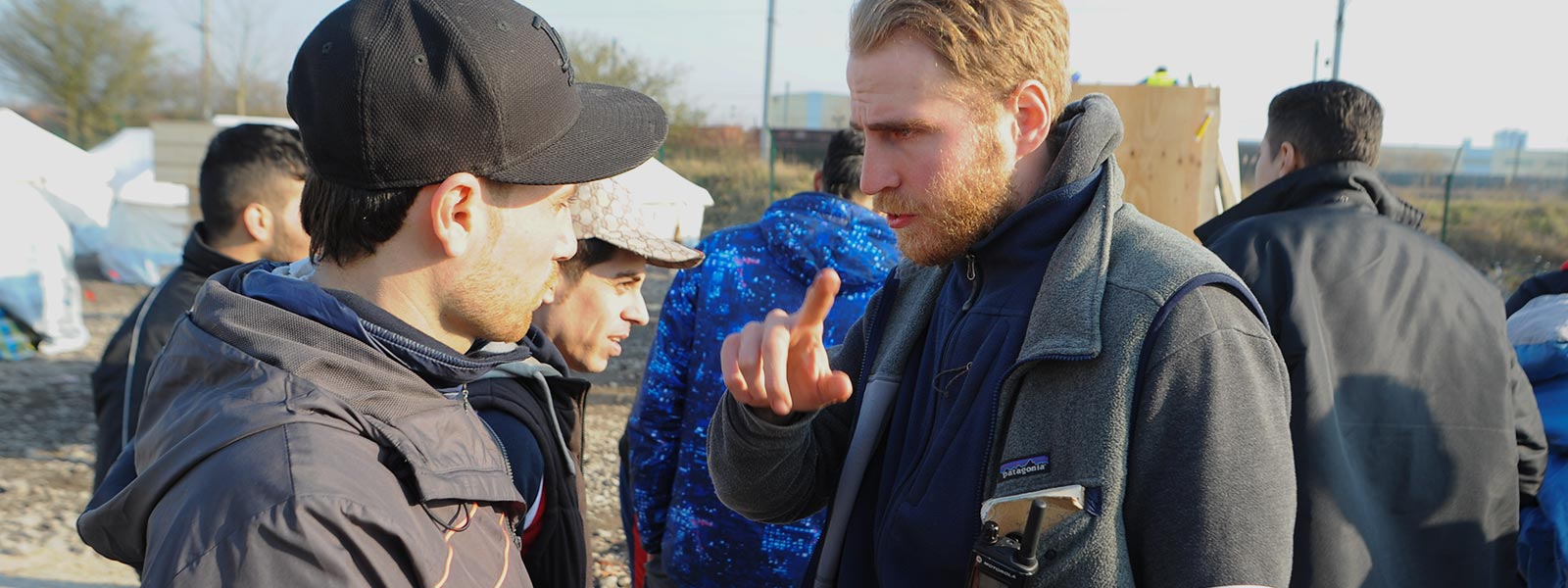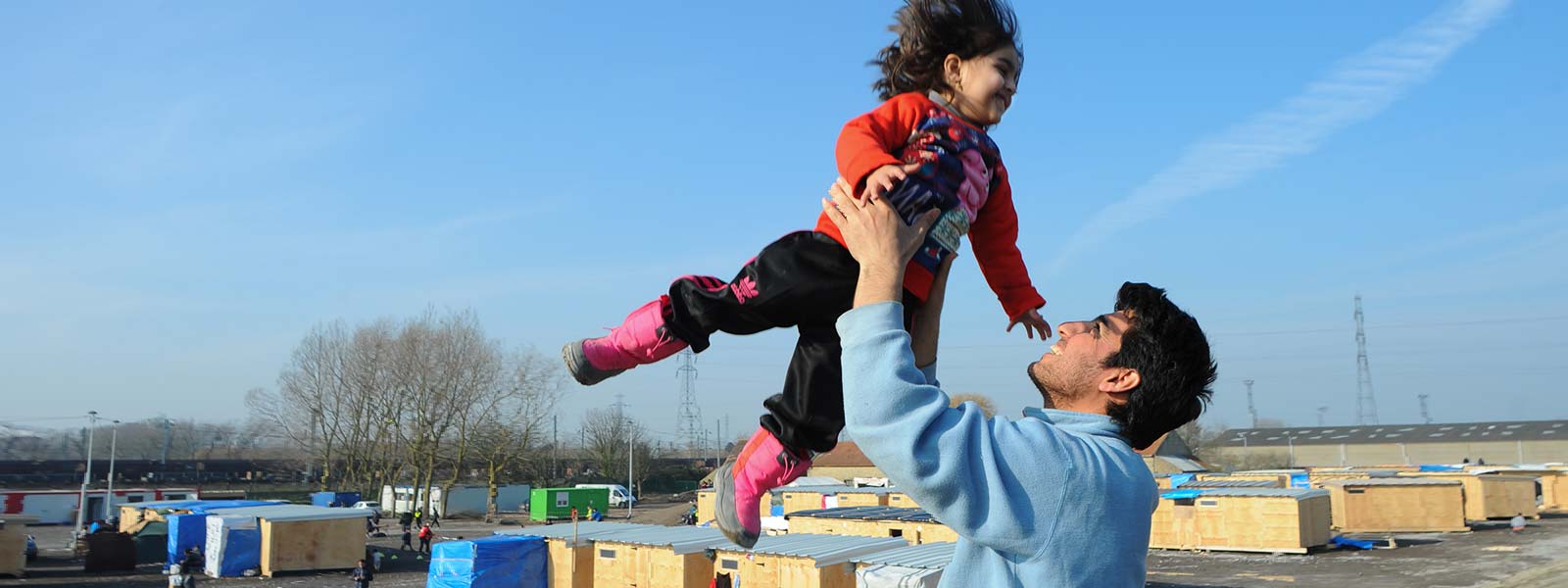Click to browse

Photo © Mehdi Chebil
France’s first-ever humanitarian camp for refugees opened on March 7 near Dunkirk, but with opposition from the French government and wrangling over who will pay for it, the Grande-Synthe camp offers an uncertain future to France’s migrants.
 Rebaz, an Iraqi Kurd, inside the cabin that he shares with his family in the Grande-Synthe humanitarian camp - Photo © Mehdi Chebil
Rebaz, an Iraqi Kurd, inside the cabin that he shares with his family in the Grande-Synthe humanitarian camp - Photo © Mehdi Chebil
The mayor of Grande-Synthe built the camp to replace a tent city that was by many accounts worse than the infamous “Jungle” of Calais. For months, the migrants in Grande-Synthe had been living in 20 hectares (49 acres) of mud and swamp with just two water fountains and no electricity. Unlike the Calais “Jungle,” however, the Grande-Synthe camp was in the middle of town, in a park across the street from a row of neat middle-class homes.
The new, humanitarian camp was relatively easy to build. The mayor’s office set aside 400,000 euros for the project, Doctors Without Borders (MSF), contributed 2.7 million euros and its expertise, and a local volunteer organisation agreed to manage the camp over the long term. It took less than two months to plan and about a week to construct. Built to the standards of the United Nations High Commissioner on Refugees, at first glance it looks a world better than the old camp: neat rows of wood cabins, men’s and women’s bathrooms every 200 metres, regular food donations and gravel to prevent flooding.
But even before it was finished the camp was caught up in the conflicting interests of the mayor who wanted it, the state that doesn’t, and the rock festival organisers who are supposed to run it. The migrants, meanwhile, are trapped between their own ambitions for a better life and the inflexibility of the European immigration system.
Out of the mud but still stuck

Photo © Mehdi Chebil
Almost as soon as they had moved into the wood cabins in the new camp, families started building extensions made out of planks, blue tarp and tents. If you share a six-square-metre cabin with three other people, you’d probably want to do your cooking and store your dirty shoes elsewhere.
As their parents work on home improvements, children roll by on bikes or play tennis with a volunteer. Young men stroll along the gravel road carrying dishes of food and fuel canisters to heat their cabins.
But take a look inside one of the cabins and it’s easy to see why no one in the camp considers it a permanent home. There are no beds, chairs or windows.
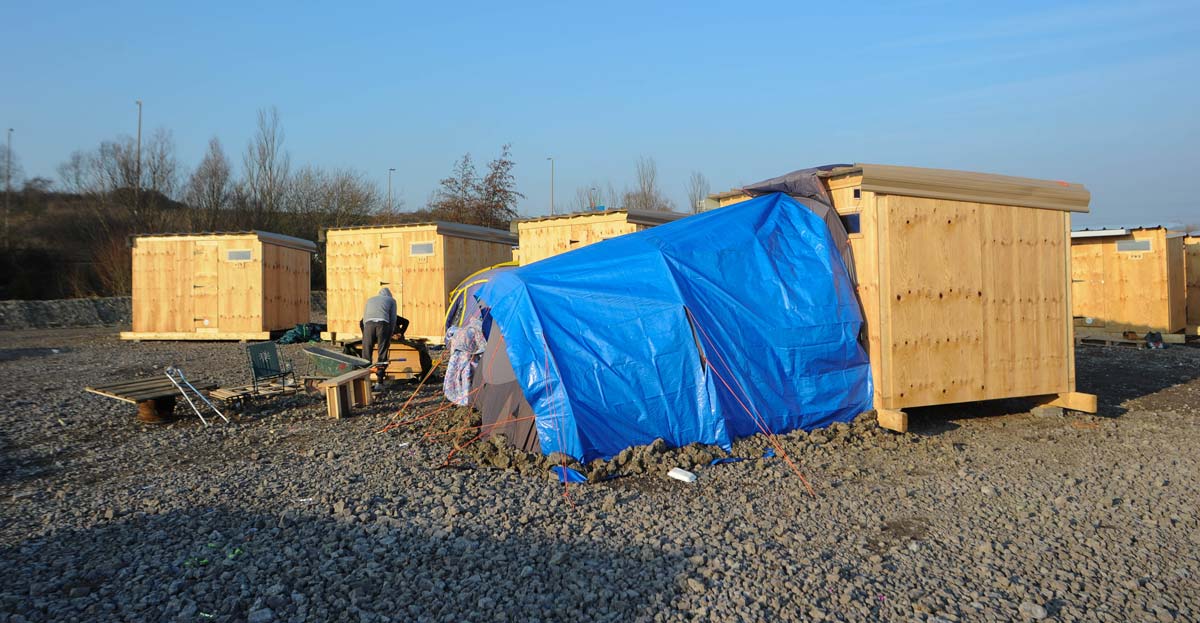
An extension built on one of the camp’s cabins - Photo © Mehdi Chebil
Rebaz, a young Kurdish Iraqi, is in the midst of helping build an extension on a friend’s cabin. The cabin floor is covered in blankets for the five people who sleep there. Jackets, pants and towels are hung up on nails along the wall.
Rebaz, like many of the people at the camp, is a young Kurdish Iraqi who wants to go to England. He has already tried to smuggle himself onto a truck headed for England about 20 times, but he has got caught each time. He says he’ll keep trying though. He says he likes France, but he’s got friends in the UK and he speaks English. In France he doesn’t have either.
"Eating, sleeping, sometimes playing football. This is not life."
Faris, Bedouin migrant
Faris, in his early 20s, is part of a small group of Bedouin Kuwaitis who live in one row of cabins. Faris explains that in Kuwait Bedouins were never given passports, so he and his family essentially have no nationality. He spent a year in Syria and learned some English there, but left because of the war.
His father and siblings are in the UK while he and his mother are stuck in the camp. He has tried to catch a truck to the UK, but for the past three months his mother has been sick so he stopped.
He and his friend like to pose in front of a Justin Bieber poster they put on the side of their cabin “for smiles”. A “welcome” sign they made in Arabic didn’t fare as well. Someone ripped it and threw it on the ground. But most of the time camp life is tedious.
“Eating, sleeping, sometimes playing football,” Faris said. “This is not life. I want to study, I want to get a job, be an engineer or translator.”
Another Kurdish Iraqi family—Hataw, her husband Rawant, and their one-year-old baby Oscar—would seem to have as good a chance as anyone to get to England, but they’re stuck too. Rawant and Oscar both hold British passports and are free to move to England. Hataw is not.
Asked whether it was better than the old camp, Rebaz shrugged unconvincingly.
For people like Rebaz, Faris and Hataw, the new camp is almost beside the point. Asked whether it was better than the old camp, Rebaz shrugged unconvincingly.
“Yes, absolutely,” he said. “It’s colder at night but what can we do? We use more blankets.”
Several people said it’s nice to have a solid house, but it’s colder at night. It’s good to have organised food distribution, but there’s not enough to eat. They don’t have to worry about mud, but they have to walk further and cross a highway to get to town.
The big problem is that the camp doesn’t get them any closer to the end of their journey. To board a truck headed for Calais, they have to meet a smuggler near town, so the relay point is now further away. Border controls at Calais have been tightened since the summer of 2015, when migrant attempts to board buses and cars were at their height. Many of the people in Grande-Synthe don’t have the additional 3,000 to 6,000 euros they will have to pay a smuggler if they do make it to England.
Even the smugglers are having a harder time in the new camp. Some volunteers told us they’d spotted some of them, arriving in cars with UK license plates and having heated conversations with their “clients”. The smugglers had free rein in the old camp but now they have to adjust to the rules of the new camp if they want to keep a low profile. One man who lives in the camp said his smuggler was too afraid to come to Grande-Synthe.
“Uncontrolled Populations”
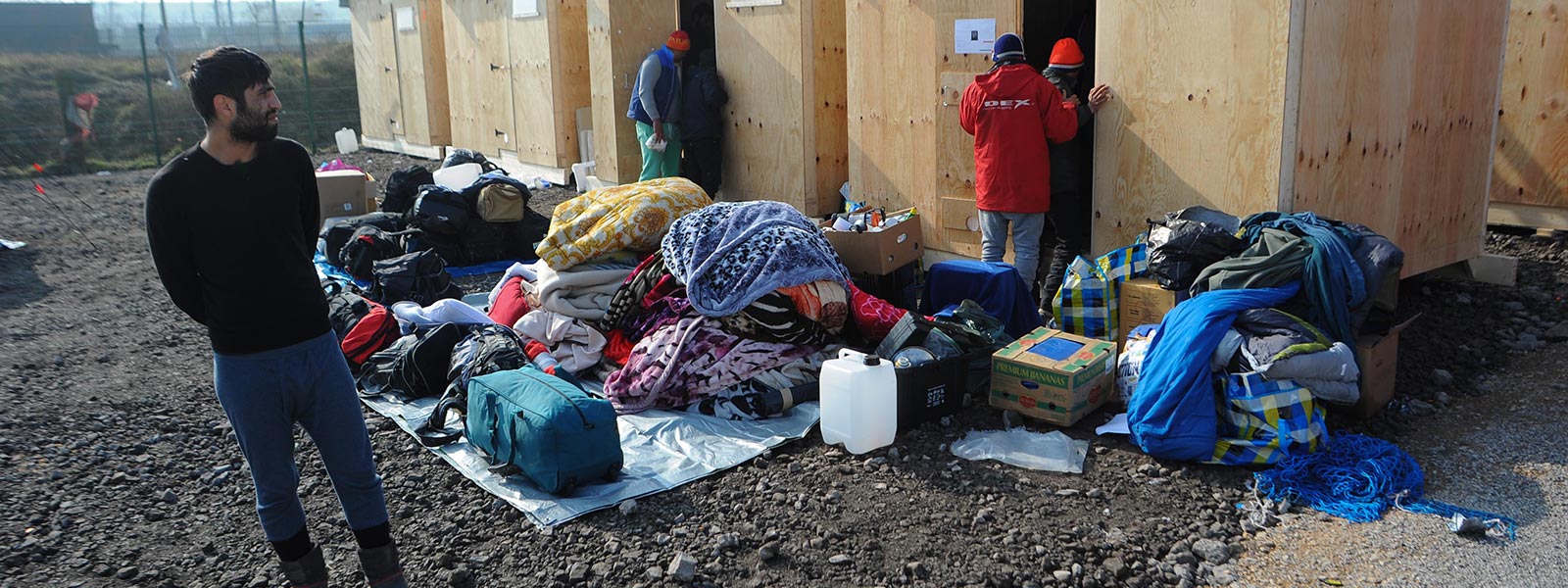
A group of men from the camp’s Iranian minority wait for their cabin - Photo © Mehdi Chebil
Smugglers are also a concern for Jean-François Cordet, Prefect of the Nord-Pas-de-Calais region, of which Grande-Synthe is a part. Cordet, the regional representative for the French state, likes to point out that 25 smugglers have been “removed” from Grande-Synthe in the last six months.
Any kind of migrant camp goes against French policy for several reasons, both official and unofficial. Near the top of Cordet’s list is that the population of a camp is not “controlled” and thus encourages people-smugglers to ply their trade.
With relations between the UK and Europe already tense over migrant issues, France does not want to look like it’s setting up a semi-permanent staging ground for illegal attempts to get to Britain. Nor does President François Hollande's government want to be seen as giving handouts to illegal migrants, especially with a presidential election coming up in 2017.
Building a humanitarian camp implicitly acknowledges that France is in the midst of a humanitarian crisis.
However, building a humanitarian camp implicitly acknowledges that France is in the midst of a humanitarian crisis. Doctors Without Borders is a French institution. The irony of the situation—that an aid group known for working in civil wars in Africa is building a humanitarian camp in suburban France—is lost on no one here, especially not Cordet.
Before he was prefect, Cordet served as director of the French Office for the Protection of Refugees and Stateless Persons (OFPRA), from 2007 to 2012. But he did not want to talk about a humanitarian crisis in France.
“It wasn’t pretty, there was mud,” he said about the old camp. “But we made sanitary inspections all the time.”
Instead, the state wants to steer the conversation towards “security regulations”, which it says the new camp violates: There needs to be a wall between the migrants and the highway, smoke detectors must be installed, and the cabins—which Cordet refers to as “bungalows”—are too close together.
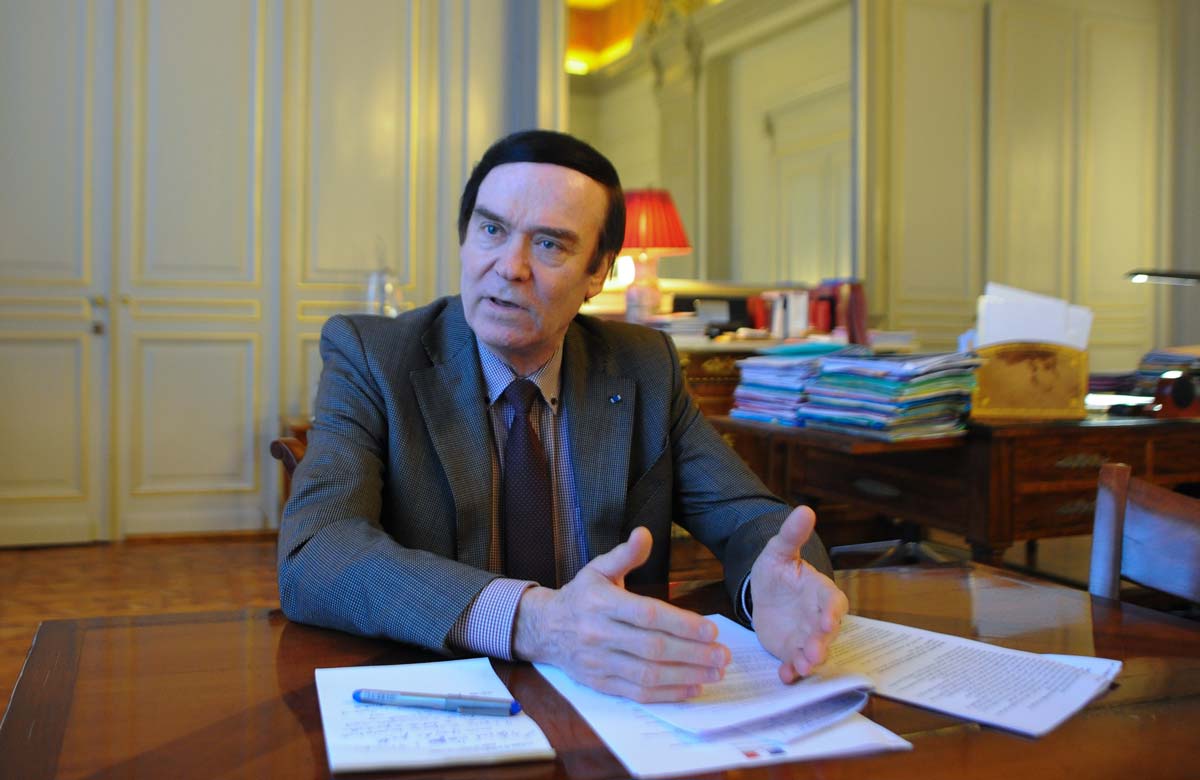
Jean-François Cordet, the representative for the French state in the Nord-Pas-de-Calais region - Photo © Mehdi Chebil
"It wasn’t pretty, there was mud. But we made sanitary inspections all the time."
Jean-François Cordet, Prefect of Nord-Pas-de-Calais
Still, Cordet refused to make any statements about MSF’s claim that the state wanted to close the camp, or about the mayor’s requests for the state to reimburse Grande-Synthe’s expenditures to build it.
“Did you ever hear me say the word ‘closing’?” Cordet told us. “I’m not trying to throw a spanner into the works. But it’s not the desire of the state to open camps.”
A migrant camp run by rock concert organisers
Raphaël Echeberry, of Doctors Without Borders, speaks with a man waiting for a cabin - Photo © Mehdi Chebil
According to Raphaël Echeberry, the MSF spokesperson at Grande-Synthe, the camp will soon meet all of the state’s security requirements.
Echeberry’s map of the camp is in tatters. But he only needs to glance at it to know where he’s going.
Echeberry describes the camp in precise terms: It currently holds about 1,300 people, all from the former Grande-Synthe camp, and will have a capacity for 2,500 when finished. It’s divided into six zones. Families and children have been housed in the first two zones, which are already fully built and are closest to the entrance, so the people won’t have as far to walk to distribution centres.
The cabins were designed by MSF and can be built in 45 minutes each. Each one measures six square metres and is built to house four people (although some families said seven people shared their cabin). Each cabin is stenciled with a neon orange number, and installed with a portable gas heater, an electrical outlet and a vent.
There are two food distribution stations, trailers with toilets and showers, a trailer to distribute blankets, and another for clothes and shoes. Each cabin receives one three-litre fuel canister per day.
"Everybody says ‘tomorrow, tomorrow’"
Ismahel yells.
Echeberry explains that MSF had a few months to study the old Grande-Synthe camp and the problems there. He points out that men aged between 20 and 45 make up 85 percent of the population. The majority are Iraqi Kurds, but there are small minorities of Kuwaitis and Iranians, and racial tensions can flare.
Single men are being housed in the zones further from the entrance. In that area the cabins are still being built, and the men wait in white tents. There are no children, no food, no music, just the men from the camp shuffling around and the MSF volunteers with their armbands quickly putting up new cabins.
An argument breaks out and a crowd gathers. Ismahel, one of the single young men, is angry because he and his friends have been waiting for three days in tent number 47 for a cabin, but the people in tent number 48 got a cabin first. Ismahel says it’s because MSF considers the people in tent 48 a family.
A young MSF volunteer in clubmaster glasses calmly tries to diffuse the situation with Ismahel. Neither of them speaks the other’s language, so they both depend on incomplete English.
“Everybody says ‘tomorrow, tomorrow,’” Ismahel yells. “I’m not people? Because no family?”
After a few minutes the situation calms down.
Clearly there are problems of communication on many levels. MSF seems prepared to handle them, but they’re only there to build the camp. Once that is finished, management of the camp will be taken over by Utopia 56.
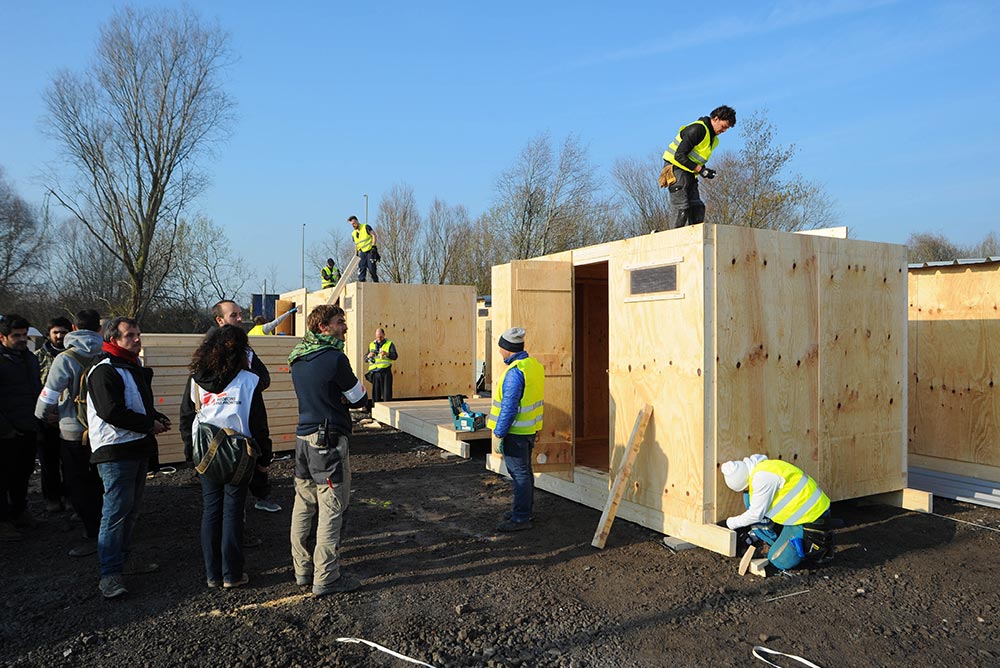
Cabins being constructed by Doctors Without Borders - Photo © Mehdi Chebil
The Utopia office is a green trailer near the front of the camp. A map of the camp is hung on the wall. Unlike Echeberry’s map, this one is crisp and bright. But the Utopia volunteers seem a little more lost.
Even the Utopia 56 founder, Yann Manzi, isn’t easy to pin down. Every Utopia 56 volunteer in the camp seems to be looking for Yann, too.
“Cécile to Yann, we need you now, Zone 5,” one of them calls into their walkie-talkie. “Gaël to Yann, the journalists from French TV have been waiting for you for 30 minutes.” “Calling Yann, can you please come to fuel distribution, we have a problem.”
The Utopia 56 people can be hard to identify, too, since they don’t wear a uniform.
Utopia 56 does not have a long history of working with migrants or humanitarian camps. They are known for organising the logistics of the Vieilles Charrues pop music festival that draws more than 200,000 people to Brittany each year.
"Calling Yann, can you please come to fuel distribution, we have a problem."
Utopia 56 volunteer
According to Armel, a Utopia 56 representative whom we spoke to by phone, the group was chosen by the mayor’s office because they knew how to handle large numbers of people, they had a network of volunteers in the area to draw on, and they had experience with trash disposal.
They are also free, which was good for the city’s limited budget.
Unlike MSF, Utopia 56 has had to learn on its feet how to handle a humanitarian camp. The first day the camp was open, they only had 800 meals for over 1,000 people. Cordet, the prefect, told FRANCE 24 that Utopia 56 had to call the police one night soon after the camp opened when they thought some people in the camp were getting out of control.
“Obviously, there will be some problems at first,” Armel said. “But we’re getting better.”
A rock concert only lasts a few days. The Grande-Synthe camp has already existed longer than that. If the camp is still there in two months or two years, which seems like a real possibility, Utopia has no way to make its volunteers keep coming back. They don’t even seem to know how many they have at the moment. Armel thought it was 50, but people in the Utopia trailer on camp thought it was more like 30 to 40.
Armel was not able to say how long they were prepared to manage the camp.
A man plays with his daughter in Zone 1 of the Grande-Synthe migrant camp - Photo © Mehdi Chebil
Another reason the state opposes the camp is that it conflicts with their own long-standing immigration policy. Jean-François Cordet, the prefect, insisted that the state had offered “individual solutions for everyone” in the old Grande-Synthe camp.
France only accepts about 25 percent of requests for asylum, far behind Sweden, Denmark and Germany.
But for the moment, that policy may offer the most promising solution for ending the journey for some migrants. According to Cordet, about 600 people from the old camp, especially the most vulnerable, have accepted spots in state-run “housing centres” and mobile homes throughout France, and have been offered care and counselling. One hundred of those people have asked for asylum in France. If accepted, they’ll be granted a 10-year residency card and the right to work and travel throughout Europe.
So why haven’t more migrants accepted the offer? For one thing France only accepts roughly 25 percent of asylum requests, far behind Sweden, Denmark and Germany.
But Cordet says that the major obstacle is that the migrants don’t speak French, English, or “classical Arabic”. The French state can’t get through to them.
"People stop on the highway up there and look at us like we’re animals."
Faris, Bedouin migrant
But a Grande-Synthe resident who lives across the street from the old camp describes the perfect order that reigned the morning the new camp opened. Hundreds of those same unreachable migrants lined up with their suitcases, bags, and tents at 8am. Somehow a small-town mayor, a group of volunteer doctors, and a handful of roadies organised the decampment of 1,300 migrants in just three days.
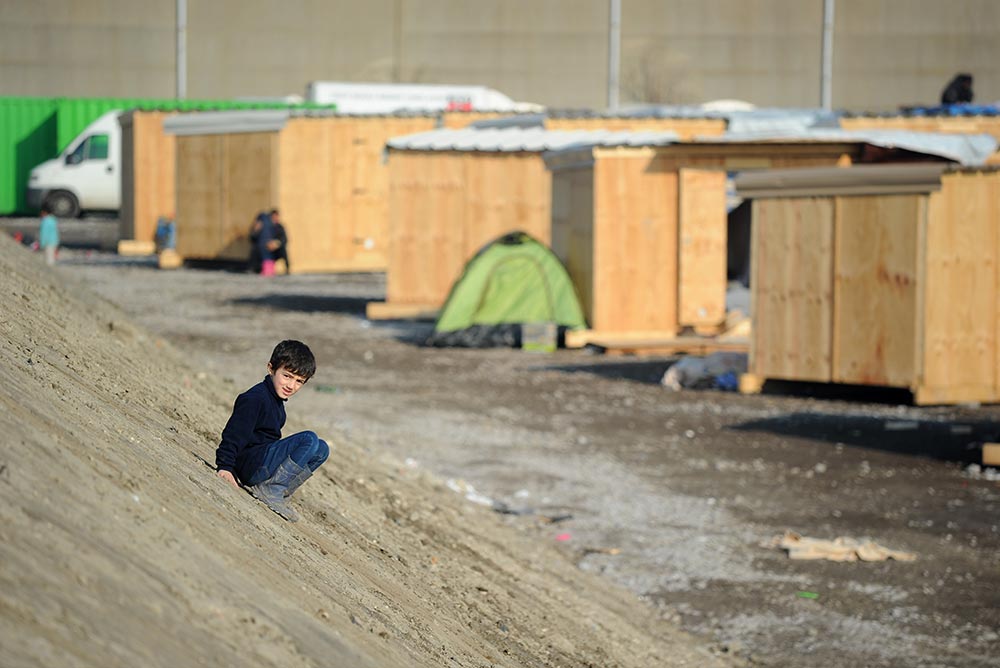
A child plays at the edge of the Grande-Synthe camp - Photo © Mehdi Chebil
Faris, the young Bedouin man, had a few thoughts about communication.
“People stop on the highway up there and look at us like we’re animals, then run away in their car,” Faris told us. “Why? You’re human and we’re human. Ask me how I feel, what I want.”

 Rebaz, an Iraqi Kurd, inside the cabin that he shares with his family in the Grande-Synthe humanitarian camp - Photo © Mehdi Chebil
Rebaz, an Iraqi Kurd, inside the cabin that he shares with his family in the Grande-Synthe humanitarian camp - Photo © Mehdi Chebil







